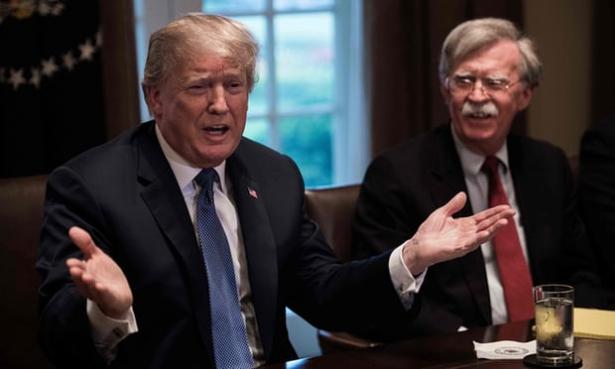On 12 May, President Trump will decide whether or not to stay in the Iran nuclear deal. If the US pulls out, as Trump has threatened to do, we could be careening down the path of another catastrophic, senseless war in the Middle East. That’s why the countervailing forces of European leaders, the UN, the US Congress and the American public are so pivotal.
The US already made a catastrophic blunder in Iran, a blunder that is still reverberating six decades later. In a foreign policy speech delivered in September 2017, Senator Bernie Sanders talked about the 1953 CIA coup that toppled Iran’s elected prime minister, Mohammad Mosaddegh, on behalf of western oil interests, and the reinstallation of the corrupt, brutal and unpopular Shah.
Sanders explained that in 1979, the Shah was overthrown by anti-American revolutionaries led by Ayatollah Khomeini, and the Islamic Republic of Iran was created. Then he mused: “What would Iran look like today if their democratic government had not been overthrown? What impact did that American-led coup have on the entire region? What consequences are we still living with today?”
To answer Sanders’ questions, without the CIA coup, there would probably never have been an Islamic revolution in 1979 or a decades-long conflict between Iranian leaders and the west. The 1979 revolution impacted the region by unleashing ferocious schisms. The new Iranian Shia leadership began vying for supremacy in the Middle East with Sunni-majority Saudi Arabia, a bitter rivalry that continues today. The 1979 revolution also created a crisis between Israel and Iran, with Iran’s religious leaders viewing the Israelis as US puppets and denouncing the oppression of Palestinians.
Today, both the Saudis and Israelis are trying to suck the US into their decades-old feud with Iran. They have both opposed the Iran nuclear deal. Israel has been advocating for the US military to bomb Iran’s nuclear facilities, even though Israel has several hundred nuclear weapons of its own and Iran has none. Saudi Arabia insists that Iran is spreading terrorism throughout the region, even though the Saudis have spent billions of dollars spreading their intolerant version of Islam, Wahhabism, around the world.
It is the Saudi’s extremist Sunni ideology, not Shiism, that forms the theological underpinnings of radical terrorist groups from al-Qaeda to Isis. While less oppressive than the Saudi monarchy, the Iranian theocracy is no model democracy. It restricts the freedoms of its citizens and gives the clerics too much power over all other branches of government. But upending the nuclear agreement will be a boon to Iran’s conservative clerics, the very ones we don’t want to embolden. President Hassan Rouhani, considered a moderate, will lose power to the hardliners, who were against negotiating with the west from the get-go. The ascendance of the conservatives could lead to a backlash against the more secular, liberal forces in Iran.
Strengthening the hardliners would also spell more chaos in the region. The Islamic Revolutionary Guard Corps (IRGC) is Iran’s elite military force responsible for protecting the Islamic regime from internal and external threats. The IRGC and its allies like Hezbollah are fighting proxy wars against the Saudis from Yemen to Syria. But Trump’s concerns about Iranian support for the “three Hs” – Hezbollah, Hamas and the Houthis – will be exacerbated if the deal is undone, as the IRGC will have an even greater justification to oppose US policies in the Middle East and to target US allies. The IRGC could immediately retaliate by attacking both Israel and US troops stationed in Iraq, Afghanistan and on military bases throughout the Middle East.
If the US breaks with the nuclear deal, Iran would be free to reconstitute its nuclear program and quickly move ahead. It could install more centrifuges and produce as much enriched uranium or plutonium as it wants. If US officials are troubled by Iran’s foreign policy now, imagine how much more powerful a nuclear-armed Iran would be. That’s why Trump’s own secretary of defense, James Mattis, has said that keeping the nuclear agreement intact is in the US national interest.
It is also why the other signatories to the agreement – France, Britain, Germany, Russia and China – want to keep it. The French president, Emmanuel Macron, just visited Washington DC, trying to convince Trump not to pull out, and the German chancellor, Angela Merkel, is meeting with Trump on Friday with the same message.
The nuclear agreement was not only made between six nations, but by the entire UN system. The UN security council approved the deal by a 15-0 vote. Putting the deal in jeopardy would compromise the entire international framework for nonviolent conflict resolution and sink international respect for US leadership to a new low.
The Trump administration should not only honor the agreement, it should use it as a springboard to work with Iran to defuse the conflicts consuming the region and to normalize relations with Tehran. Unfortunately, the triumvirate of Trump, the national security adviser, John Bolton, and secretary of state, Mike Pompeo, are likely to pull in the opposite direction. It’s up to us to push back. Before the Trump wrecking crew destroys the best global foreign policy achievement in the last decade, the world community – including the UN, Congress and the public – has to stop them.
Medea Benjamin is cofounder of the peace group CODEPINK and author of the new book Inside Iran: The Real History and Politics of the Islamic Republic of Iran
If you liked this article please help support The Guardian. Make a monthly commitment to support The Guardian long term or a one-time contribution as and when you feel like it – choose the option that suits you best.


Spread the word